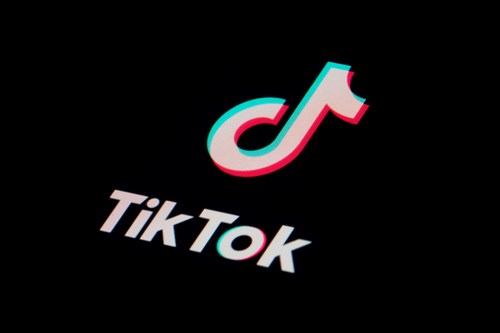Scanning the most-viewed categories on TikTok could leave one with the impression that the only secrets China could unearth from the wildly popular social media platform are how Americans lose weight, renovate their homes, and shake it on the dance floor.
It's much more than that, of course. But are the concerns enough to risk the First Amendment rights of millions of Americans?
 Critics of H.R.7521 – which passed this week with bipartisan support and would force TikTok's Chinese owner "ByteDance" to sell or be banned – see free-speech issues and undue government influence in business.
Critics of H.R.7521 – which passed this week with bipartisan support and would force TikTok's Chinese owner "ByteDance" to sell or be banned – see free-speech issues and undue government influence in business.
Proponents says the bill – which specifically targets foreign companies – could not be used against U.S. citizens. Critics say in response: when there's a will, there's a way.
"My concern, you saw what they did with The Patriot Act. It was passed, quote-unquote, to 'protect' us [after 9-11] under George W. Bush, but then it was turned by lunatic leftists," Chris Salcedo, a Houston, Texas-based conservative show host, said on American Family Radio Thursday.
Still others say China poses far greater threats that are being ignored in Washington.
Don't you be my neighbor
Last summer, NBC News reviewed U.S. Department of Agriculture filings on land purchases and leases by foreign governments. Federal law requires transactions to be reported to the USDA within 90 days of completion. NBC found 11 purchases by Chinese entities had been reported between Jan. 1, 2022 and June 30, 2023.
Similar to "gotaways" at the border, sometimes transactions go unreported. At least one purchase was not reported until it had been revealed in news accounts. Smithfield Foods, purchased by a Chinese company in 2013, purchased 186 acres in Missouri and North Carolina in 2022 and 2023.
"There are important issues to be addressed between the U.S. and China," Smithfield executive Jim Monroe told NBC News. "Ownership of U.S. agricultural land isn't one of them."
Walker Wildmon, a vice president with American Family Association, disagrees.

"There are major issues that should be bipartisan that they're not talking about that Congress isn't talking about regarding China, and it has nothing to do with TikTok and ByteDance," Wildmon told shot host Jenna Ellis.
He listed three of what he called a "litany" of examples of Chinese influence that should outpace Congress' TikTok concerns:
- Pharmaceutical drugs originating from China.
"The vast majority of our pharmaceutical supply chain originates in China. For example, insulin and … all these major drugs that people survive on and rely on every single day, and even during the pandemic, all of those are coming from China. China has a stranglehold on America's pharmaceutical supply chain and can cut it off at any moment – and Congress isn't talking about that," Wildmon said.
- Cell phone technology produced in Taiwan, and China's aggression toward its smaller neighbor.
"Then you can get into the … chips that go into our phones and how they're all based in Taiwan; and China is moving on Taiwan in different ways. What happens if China moves on Taiwan and cuts off the semiconductor supply chain to America and we don't have chips anymore?" Wildmon wondered.
- China's purchase of land in the U.S.
"You've got the Chinese Communist Party buying land in America. They're buying farmland in our own backyard that could lead to taking away the control of our agricultural supply chain in our very own nation," he said.
"That's just three issues that Congress could get together on and do something on, but instead it's TikTok. Those three issues are major things that do affect national security, and if we were to get in a spat with China, they're going to leverage those things against us and it could prove deadly."
Look who's supporting the bill
Congress has pushed TikTok to the top of the list in a way that gives Wildmon pause.
"I'm concerned about the number of Democrats who support this legislation. I don't remember the last time all the Democrats got on board with legislation, and it wasn't a good idea, so I'm a bit skeptical. I get where people are going here, security concerns with all the data going back to China, but what are the broader ramifications here, and do the Democrats have anything tucked up their sleeve?"
It seems an about-face for President Joe Biden, who was linked to a family money-laundering scheme in which he was to receive 10% of the take, according to findings from the House Oversight Committee. Biden communicated through fake email accounts throughout the process, the committee said.
"The Democrats and Biden have been in bed with China for decades, so why all of a sudden do they have this virtuous feeling that we've got a ban [being considered]?" Wildmon asked.
In fact, Biden's reelection campaign team launched a new TikTok account in an effort to target young voters just last month.
Biden has said he'll sign a TikTok ban bill if it reaches his desk, leaving some to speculate that would be an election-year move to allow him to project a "tough on China" image.
Rep. Bob Good (R-Virginia), the chairman of the House Freedom Caucus, conceded to Ellis that good legislation can be abused. However, Good is confident in the strength of the bill and sees it as the necessary available choice.
The Chinese Communist Party does not have First Amendment protections in the U.S., he noted.

"While imperfect, and there are legitimate concerns raised by some of my conservative friends, I think the overwhelming 'more right' position was to restrict the Communist Chinese Party's access to our intelligence, our data, U.S. citizens' data, that sort of thing. I think it's more of a greater national security threat that is at stake," he said.
The bill was written with China, North Korea, Russia and Iran in mind, Good explained.
"[Those are] adversarial nations that wouldn't have the ability to access or have controlling interest in entities that would not have the ability to capture U.S. data, to surveil on U.S. citizens, those types of things that compromise our national security. There's concern there, but I think the greater concern is what China is doing. There's no business in China that's not controlled by the CCP."
When 'contact your congressman' is not a choice
Good said Congress has been flooded with calls from Americans because of the CCP's manipulation of the TikTok apps on their phones.
"They put in a feature when this bill was coming before Congress that every user was unable to use TikTok until they contacted a member of Congress," said the congressman. "So, they were blocked from using [the app] until they clicked on something that automatically called their member of Congress.
"That's their ability to control the users that was exercised," Good concluded. "That was forced by TikTok on their users for their nefarious purposes."
Editor's Note: The American Family Association is the parent organization of the American Family News Network, which operates AFN.net.







